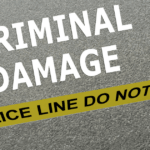 Keying the car of someone who angered you - Leaving a foul-smelling substance in a co-worker’s office - Breaking off a piece of your neighbor’s fence. All of these are examples of criminal damage to property, and while they might seem like small annoyances to some, they can lead to serious consequences if the person who owned that property decides to file a lawsuit or pursue criminal charges. Here is what you need to know about criminal damage to property in Illinois, so you can avoid finding yourself in that situation.
Keying the car of someone who angered you - Leaving a foul-smelling substance in a co-worker’s office - Breaking off a piece of your neighbor’s fence. All of these are examples of criminal damage to property, and while they might seem like small annoyances to some, they can lead to serious consequences if the person who owned that property decides to file a lawsuit or pursue criminal charges. Here is what you need to know about criminal damage to property in Illinois, so you can avoid finding yourself in that situation.
Defining Damage to Property
There is no single definition of criminal damage to property, as Illinois Statutes 5/21-1 lists several acts that count as committing this offense. Among the many possible acts of criminal damage, circumstances include when one:
- “Knowingly damages” someone else’s property or sets fire to someone else’s land
- “Knowingly injures” someone else’s pet without their consent - if the animal is domestic, criminal damage charges could apply
- Damages someone else’s property “recklessly by means of fire or explosives”
- “Knowingly deposits … a stink bomb or any offensive smelling compound” on another’s land or building
- “Knowingly damages any property” in an attempt to collect insurance money, other than damaged caused “recklessly” through the use of fire or explosives
- Intentionally fires a gun at “any portion of a railroad train”
- “Knowingly, without proper authorization, cuts, injures, damages, defaces, destroys, or tampers with” any equipment or “apparatus” used in fire-fighting, which includes opening a fire hydrant
The Consequences
Under the laws of Illinois, criminal damage to property may be a relatively minor misdemeanor or a serious felony. The courts determine the severity of a sentence for this offense based upon the value of the property that was damaged:
- If the value is less than $500, violators commit a criminal damage to property misdemeanor. Being convicted of a Class A Misdemeanor can mean paying a fine as high as $2,500 and serving as much as a year in prison.
- If the value is between $500 and $10,000, it is a Class 4 felony. Anyone convicted of this will have to pay a fine of up to $25,000 and spend between 1 and 3 years in prison.
- Criminal damage to property can reach the level of Class 3 felony if the damage is between $10,000 and $100,000. That can mean a prison term of 2 to 5 years and a maximum fine of $25,000.
Different penalties can be sentenced for this charge depending on the type of property that is damaged. If you cause any damage to anything used for fighting fires - such as a hydrant, a fire hose, or a fire engine - you can face a Class B Misdemeanor, technically the lowest possible penalty for criminal damage to property. This sentence carries a maximum of 6 months in jail and $1,500 in fines.
On the other end of the spectrum, you can receive higher penalties if you damage “property of a school or place of worship or to farm equipment or immovable items of agricultural production.” This also applies to any property that “memorializes or honors” anyone in the police force, fire-fighting force, or Armed Forces. If convicted for any of these offenses, the severity of your sentence will be one level higher than if the damage had been done to any other kind of property.
For example, this means that if someone causes less than $300 in damages to farm equipment, it would jump from a Class A Misdemeanor to a Class 4 Felony, a shift that might mean a significant increase in the fine that needs to be paid and the prison time that needs to be served. Someone who commits more than $100,000 in damages to a church may face not a Class 2 Felony, but a Class 1 felony - the highest class of penalty for criminal damage to property. Instead of serving between 3 and 7 years in prison, the accused might have to serve between 4 and 15.
Criminal damage to property is not a charge to be taken lightly, and it’s always best to have an experienced Chicago criminal damage attorney at your side. If you or a loved one is seeking legal representation or advice, the criminal defense attorneys at Mitchell S. Sexner and Associates LLC are ready and able to assist you. Call us at (312) 644-0444 for a free consultation today.

